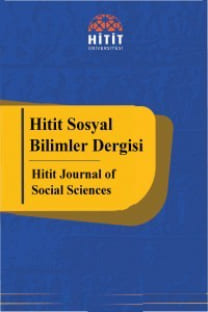ENHANCED REPERTOIRE IDENTITIES: PATHWAYS TOWARD POLITICAL VIOLENCE, TERRORİSM
Repertuar, Kimlik, Siyasi Şiddet, Terörizm
PEKİŞMİŞ REPERTUAR KİMLİKLER: SİYASİ ŞİDDETE, TERÖRİZME GİDEN YOLLAR
___
- Craig Calhoun. 1991. “The Problem of Identity in Collective Action.” In Micro-Macro Linkages in Sociology, ed. Joan Huber. London: Sage: 51-75.
- Crotty, William J. 2005. Democratic Development & Political Terrorism: The Global Perspective. Boston: Northestern University Press.
- Goodwin, Jeff. 2001. No other Way Out: States and Revolutionary Movements, 1945-1991. New York: Cambridge University Press.
- Gould, V. Roger. 1995. Insurgent Identities: Class, Community, and Protest in Paris from 1848 to the Commune. Chicago: The University of Chicago Press.
- Hafez, Mohammed.M. 2003. Why Muslims Rebel: Repression and Resistance in the Islamic World. Lynne Rienner Publishers.
- Johnston, Hank and John A. Noakes ed. 2005. Frames o f Protest: Social Movements and the Framing Perspective. Lanham: Rowman and Littlefield Publishers.
- Ozdamar, Ozgun. 2008. “Theorizing Terrorist Behavior: Major Approaches and Their Characteristics.” Defence against Terrorism Review. Vol. 1, No. 2: 89-101.
- Tilly, Charles. 1995. “Contentious Repertoires in Great Britain, 1758-1834.” In Repertoires and Cycles o f Collective Action. Edited by Mark Traugott. London
- Yavuz, Hakan M. 2003. Islamic Political Identity in Turkey. Oxford, New York: Oxford University Press.
- Young, Crawford. 1976. The Politics of Cultural Pluralism. Madison: University of Wisconsin Press.
- Yayın Aralığı: Yılda 2 Sayı
- Başlangıç: 2008
- Yayıncı: Hitit Üniversitesi
AY’IN EVRELERİ ETKİSİNİN BORSA İSTANBUL 100 ENDEKSİ’NDE GARCH (1,1) MODELİ İLE TEST EDİLMESİ
KIRSAL TURİZM POTANSİYELİNİN SWOT ANALİZİ İLE DEĞERLENDİRİLMESİ: YOZGAT İLİ ÖRNEĞİ
Yusuf ERSOY, Ali TEHCİ, Bünyamin ERSOY
8. SINIF BASİT MAKİNELER ÜNİTESİNE YÖNELİK BAŞARI TESTİ GELİŞTİRME: GEÇERLİK VE GÜVENİRLİK ÇALIŞMASI
Emin Berk OZKAN, Özlem ERYILMAZ MUŞTU
DOĞRUDAN YABANCI SERMAYE YATIRIMLARININ EKONOMİK KALKINMA ÜZERİNDEKİ ETKİSİ: OECD ÜLKELERİ ÖRNEĞİ
Mahmut Ünsal ŞAŞMAZ, Yunus Emre YAYLA
TURİZMİN İKTİSADİ SÜRDÜRÜLEBİLİRLİĞİ AÇISINDAN KIŞ TURİZMİ
KATILIM BANKALARINDA YÖNELİK YATIRIMCI ALGISI: ÇORUM İLİ ÖRNEĞİ
BİLİME ADANMIŞ ÖMÜR: NASURİDDİN TUSİ
PERGAMON'UN GÖLGESİNDE BİR KOMŞU KENT: ATARNEUS
